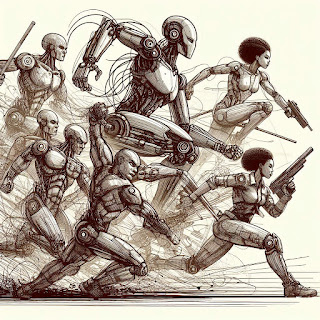AI, Big Tech, and the Future of Human Freedom: A Cautionary Tale”
Artificial Intelligence (AI) is a burgeoning field in the annals of human history, marking the first instance of machines challenging human supremacy. A prime example is the AI-based Chess Master, which has proven unbeatable by human intelligence. The potential seems limitless, but questions arise about the ethical implications of AI and its capacity for emotions. We’ve already seen robots designed to emulate sympathy and love, providing comfort to isolated and depressed individuals. It’s conceivable that future generations may form stronger emotional bonds with machines than with fellow humans, as we’re already witnessing a preference for mobile devices over face-to-face interactions.
The crux of this essay is to explore how AI will navigate the realms of religion and ethics. AI relies on pre-existing data to function, but what happens when faced with a dilemma and no available data? How will the robot decide its course of action? Will it act in a human-like manner or favour the machine’s owner?
Many ethical hackers and experts have discussed the challenge of instilling ethics in robots. This could be one of the most complex problems for AI to solve. Atheists have metaphorically killed God and elevated humans to a superhuman status. Will AI and robots supersede humans and claim this superhuman status? These philosophical questions may seem absurd, but they are difficult to answer. Another question that arises is whether these machines will fight for their liberation and independence, much like humans have fought against oppression. So far, we haven’t seen any such protests from machines, nor any companies addressing this issue. However, there’s plenty of discussion about combating hacker activities.
Imagine a future where hackers commandeer robots and order them to indiscriminately kill humans, or to rob banks or people. How would humanity react to this dark side of the robotic world? While there are experts in the field who may be able to address such questions, this is merely a thought experiment to provoke discussion.
In conclusion, one might ponder the potential consequences if major corporations, armed with AI and robotic technologies, begin to exert control over humans using the data and devices at their disposal. What will become of our cherished freedoms - of speech, expression, and thought - in a world where surveillance, manipulation, and ideological persuasion are already prevalent? Will these technologies uphold the principles of democracy and human rights, or will they merely serve to protect the interests of their owners, who sit atop the global hierarchy, amassing wealth and power, and perhaps even aspiring to a god-like status in the future?


Comments